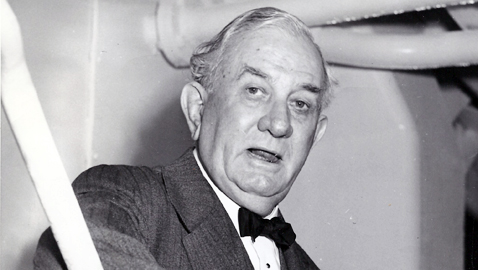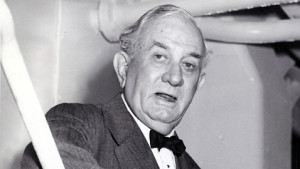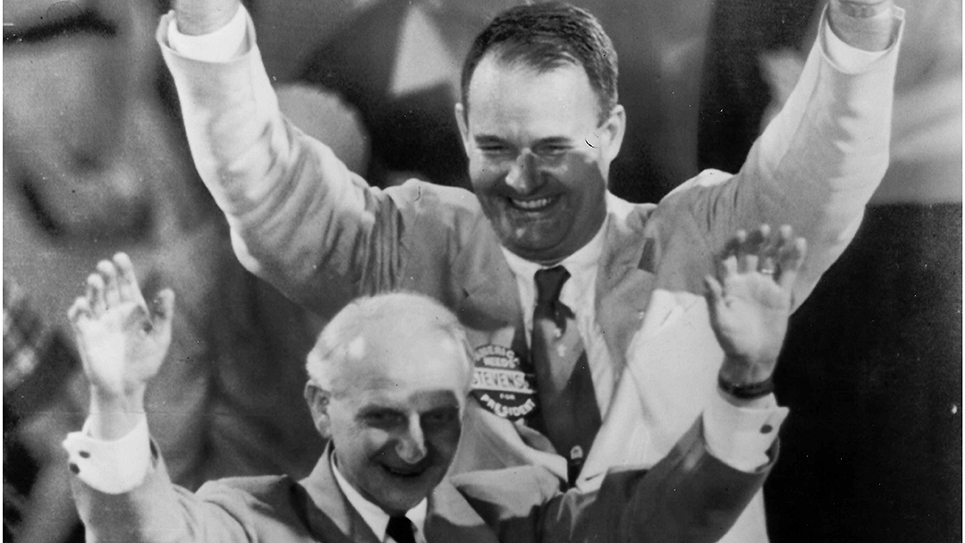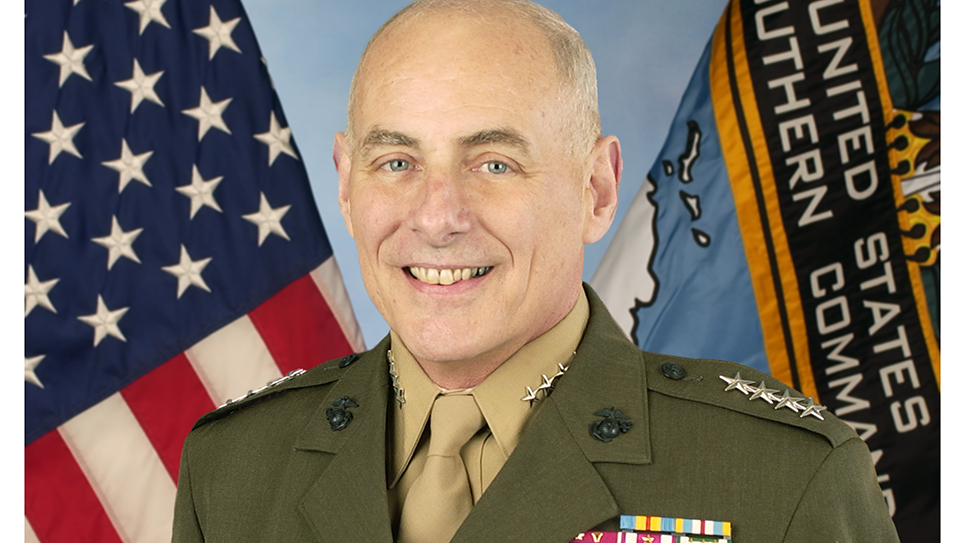When folks think in terms of Texas and Connally, the late Governor John Connally usually comes to mind, but there was another Connally who enjoyed a much longer political career: Thomas Terry Connally. Tom Connally was no relation to John Connally and during his time, was far better known.
Tom Connally was born August 19, 1877 in McLennon County, Texas. His father, Jones Connally, was a Confederate veteran and young Tom was the only surviving son in his family. By 1898 Tom Connally had his law degree from the University of Texas in hand and two years later, at the age of twenty-three, he was elected to the Texas House of Representatives. Young Tom Connally was so well known locally, he was unopposed in both of his campaigns for the Texas State legislature. Connally decided against seeking a third term and settled in the small town of Marlin, Texas, to practice law. Connally was then courting his future wife, Louise Clarkson, and the two married in 1904. Mrs. Connally was quite a lady, having been a classically trained vocalist. Tom and Louise Connally were to have but one child, a son named Ben. After his wife’s death, Tom Connally was to say about his wife, “She loved me, but she adored Ben.” Mrs. Connally was a wealthy woman and when she died, Tom Connally signed over her entire estate to his son.
In 1906, Tom Connally became the prosecuting attorney for Falls County, Texas. Connally returned to private practice after a four-year stint as prosecuting attorney, although he was very active in several fraternal orders, as well as the Methodist Church. In 1916, the local Congressional seat came open and Tom Connally determined to run, despite the fact the seat was centered around Waco. Still, Connally proved to be such an able campaigner that he won the primary over two opponents without being forced into a run-off election. Tom Connally was on his way to Congress. Connally won a seat on the House Foreign Affairs Committee and throughout his Congressional career, Tom Connally’s chief interest would remain foreign policy. During the decade of the 1920s, the Republicans dominated the White House and Congress, but Congressman Connally was frequently used as a spokesman by the Democratic Party on foreign affairs.
Connally’s service in the U. S. House of Representatives had been interrupted by America’s entry into World War I. Nothing would do but for Congressman Connally to enlist, although he did not resign from Congress. Connally had also volunteered to fight in the Spanish—American War and both wars were over before he saw action, causing Connally himself to say he had been “in more wars and fought less than any living man.”
In 1928, Connally was announced as a candidate for the United States Senate against incumbent Senator Earle B. Mayfield. Mayfield had been elected six years earlier with the support of the Ku Klux Klan and was himself a Klansman. The South usually retained its senators for many years, so a campaign against an incumbent was especially risky at that time. Connally took a different approach during the campaign and ridiculed Senator Mayfield for his Klan membership and while the KKK was no longer at the peak of its political power, it was a courageous thing to do. Connally regularly denounced the “bed sheet and mask candidates” in his speeches all across Texas and won the election.
Tom Connally returned to Washington, D. C. in 1929 as the junior United States Senator from Texas, just as Herbert Hoover was taking the oath of office as President. It was only seven months before the stock market crashed and the Great Depression began. Senator Connally fought many of Hoover’s remedies to right America’s economic woes, including a national sales tax and raising the tariff.
Connally, like virtually every other Democrat in the country, was bitterly opposed to Hoover and longed for the outwardly icy engineer to be defeated. Connally might have preferred to support the presidential candidacy of New York Governor Franklin D. Roosevelt, but Texas had its own candidate in House Speaker John Nance Garner of Uvalde. When Roosevelt was nominated and selected Speaker Garner as his running mate, Connally was delighted.
Senator Connally naturally supported most of the New Deal legislation proposed by FDR, but he never neglected the concerns of Texas. Connally was busy with bills affecting cotton farmers, cattle ranchers, and the oil industry. Like virtually every other industry in the country, oilmen, both the large companies and independent operators, were severely and adversely affected by the Depression. Connally responded by introducing what became known as the Hot Oil Act of 1935. Connally’s bill made the interstate shipment of any oil produced in violation of newly established state quotas illegal.
1935 was also the year that Tom Connally suffered a devastating personal blow. His wife Louise had been out shopping and came to Senator Connally’s office feeling tired. Mrs. Connally suffered a heart attack and died in her husband’s office so quickly it left Tom Connally stunned and numb.
Tom Connally’s first break with the popular Franklin D. Roosevelt came when FDR proposed expanding the U. S. Supreme Court. Connally refused to go along and opposed the court packing bill. In his memoirs, Connally admitted his personal relations with President Roosevelt suffered as a result, as a distinct chill emanated from the White House toward the Texan. FDR was not above being petty in showing his displeasure and Connally remembered his humiliation when President Roosevelt announced the appointment of a new Federal Judge for Texas as Connally stood nearby and it was clear the senator had not been consulted. Connally had recommended someone else for the appointment, a fact that was not lost upon Texans. Senator Connally had to endure another such embarrassment when FDR was in Texas and mentioned several of his “good friends” in the Congressional delegation, but made not a single mention of Tom Connally.
Still, Tom Connally remained strong in Texas and had been reelected in 1934, defeating Joseph Weldon Bailey, Jr., the son of a legendary former senator who had become something of an icon in the Lone Star State. Senator Connally’s deteriorating relations with FDR did little to hurt him with the voters at home, where Roosevelt was becoming far less popular, and he was reelected in 1940 with minimal opposition.
Tom Connally, a widower, shared a large bachelor apartment in Washington, D. C. with his good friend, Senator Kenneth McKellar of Tennessee. The arrangement ended when Tom Connally married the widow of Texas’s other United States Senator, Mrs. Lucille Sanderson Sheppard. The new Mrs. Connally was evidently even more wealthy than her predecessor and they lived quite comfortably in the nation’s Capitol and the Senator would arrive at his office every morning in a chauffeured limousine.
Senator Connally was something of a flamboyant character and easily recognizable by his personal appearance. Connally’s silver locks flowed over the back of his collar and he was usually dressed in carefully tailored suits and invariably had a half smoked cigar in one hand. His grandson, Judge Richard Arnold, remembered Senator Connally’s starched white shirts had no buttons; the Texan preferred the more elaborate shirt studs and cuff links.
Tom Connally was also one of the more nationally famous senators due to his prominence in foreign policy, as well as his speaking ability. Connally’s Texas wit and sarcasm were formidable. TIME magazine recorded some of Tom Connally’s biting sarcasm in its obituary on the former senator. Connally once told New Hampshire Senator Styles Bridges he should “approach these matters with an open mind instead of an open mouth.” Connally’s observation about Chiang Kai-shek, the leader of Nationalist China, was equally to the point and caustic. “The trouble with the Generalissimo is that he doesn’t do any generalissimoing.”
Senator Connally had made a radio speech about the threat of war just days before the Japanese bombed Pearl Harbor, but like most members of Congress, Connally was stunned by the attack. Summoned to the White House, Connally was astonished by the explanations offered by Secretary of the Navy Frank Knox, leaving the Texas senator muttering about “that goddamned Frank Knox.”
1941 was also the year Tom Connally became Chairman of the Senate’s Foreign Relations Committee. It was the apex of his career and it was Tom Connally who brought to the Senate floor the resolution declaring war on the Axis powers following FDR’s dramatic speech about “a day which will live in infamy.” Connally became the Senate spokesman for the Roosevelt and Truman foreign policies. While Connally was successful for the most part in pushing those foreign policy initiatives, as well as helping to create a bipartisan approach in the Senate, it came with a price in Texas.
Senator Connally was easily reelected in 1946, just after having received tremendous national publicity for his participation as a member of the U. S. delegation to the San Francisco conference approving the Charter for the United Nations. In fact, Tom Connally was the second American to affix his signature to the Charter after Secretary of State Edward Stettinius.
In 1948 Harry Truman accomplished the impossible by winning the presidency in his own right and the Democrats had captured both Houses of Congress, making Tom Connally Chairman of the Senate Foreign Relations Committee once again. Connally also had a new Senate colleague from Texas, young Lyndon Johnson who proceeded to pay a call on Senator Connally. Connally was back in Texas, staying in a suite of rooms at the old Falls Hotel in Marlin when Johnson arrived to seek Connally’s help in securing the best possible committee assignments. Author Robert Caro, in his excellent multi-volume biography of Johnson, relates that the newly elected senator “got off on the wrong foot with crusty, irritable Marse Tom.”
According to the story related by Robert Caro, LBJ started the conversation by stating his desire to serve on the Foreign Relations and Finance Committees, both of which coincidentally, Connally served on himself. Senate rules generally forbade two senators from the same state serving on major committees. Connally apparently used the occasion to needle Johnson, whipping out a book listing committee assignments and pointed out LBJ could serve on the Agriculture Committee. “You’re for the farmers, ain’t you, Lyndon?” Connally drawled.
Senator Connally then pointed out Johnson could be helpful to Texas A&M University by serving on the Armed Service Committee and again asked, “You’re for the A&M, ain’t you, Lyndon?”
Johnson quietly acknowledged he was indeed for both farmers and Texas A&M University and Connally replied that after LBJ had been in the United States Senate for sometime, then he could get on one of the better committees and “render a real service” to Texas and the nation.
Lyndon Johnson carefully avoided irritating his senior colleague during the four years they served together in the Senate, but Tom Connally’s time was coming to an end. Texas was deeply divided and Governor Allan Shivers led a far more conservative wing of the Democratic Party and by 1952 many believed Shivers was eyeing Tom Connally’s Senate seat. When Shivers finally announced he would run for governor again, Texas Attorney General Price Daniel declared his own candidacy for the Senate. Tom Connally returned to Texas and quickly discovered to win another term would involve raising a massive campaign war chest, as well as an intensive canvass of the state. Polls indicated the unpopularity of the Truman administration would make it difficult for Connally to win again, as he was publicly identified in the mind of many Texans as Truman’s foreign policy spokesman. Connally’s long interest in foreign affairs caused many Texans to grumble their senator was far more interested in Europe and Asia than Texas.
Tom Connally decided against running again and retired, living in Washington, D. C. Connally dictated a lively autobiography, joined a law firm, although he largely used his office merely to meet and greet friends from his heyday in Congress. Connally’s chauffeur would regularly take the old Texan back to Capitol Hill where Tom Connally would have his long silvery locks trimmed.
Age and infirmity caught up with Tom Connally, as it does everyone, and he died in Washington, D. C. of pneumonia on October 28, 1963.
Stories in this Week's Focus
- The Knoxville Focus for November 10, 2025
- Publisher’s Positions
- Rams run past St. George’s in weather-shortened first-round playoff game
- The Governor: Elbert Carvel of Delaware
- Special Knox County Veterans Luncheon scheduled for January
- Falcons are already a work in progress
- The Knoxville Focus for November 3, 2025
- Publisher’s Positions
- Fulton ends season with two wins and, hopefully, confidence
- The Restoration of the Truman White House








